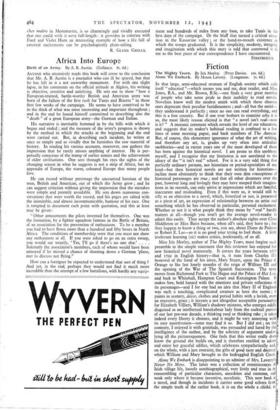Africa Into Europe
Birth of an Army. By A. B. Austin. (Gollancz. 8s. 6d.)
ANYONE who attentively reads this book will come to the conclusion that Mr. A. B. Austin is a journalist who can ill be spared, but that he has left in it a not unworthy monument. For with one slight lapse, in his comments on the official attitude at Algiers, his writing is objective, sensitive and satisfying. He sets out to show " how a European-trained, battle-worthy British and American army was born of the failure of the first rush for Tunis and Bizerta " in those first few weeks of the campaign. He seems to have contrived to be in the thick of what was most interesting and important throughout ; and in the end he found himself committed to describing also the " death " of a great European army—the German and Italian.
His narrative is inevitably hemmed in by the hills with which it began and ended ; and the measure of the army's progress is shown by the method in which the attacks at the beginning and the end were carried out. But, in describing each incident, he writes at once so simply and so vividly that he furnishes the raw material of history. In reading his various accounts, moreover, one gathers the impression that he rarely misses anything of interest. He is per- petually conscious of the tramp of earlier armies and the achievement of older civilisations. One sees through his eyes the sights of the changing season in what he suggests is not a strip of Africa, but an appendix of Europe, the warm, coloured Europe that many people love.
He can record without patronage the uncounted heroism of the men, British and American, out of which the Army grew ; and he can suggest criticism without giving the impression that the mistakes were simple and patently avoidable. He sets down numerous con- versations that were worth the record, and his pages are salted with the inimitable, and almost incommunicable, humour of his race. One is tempted to document each point with quotation, and this at least may be given: " Other amusements the pilots invented for themselves. One was the formation, by a fighter squadron famous in the Battle of Britain, of an association for the prevention of enthusiasm. To be a member you had to have flown more than a hundred and fifty hours in North Africa. The conditions of membership were that you must not show any enthusiasm at all. If you were asked to go on an extra sweep, you would say wearily, Yes, I'll go if there's no one else.' . . . Solemnly the association's members, each of whom would have been annoyed if he missed a chance of shooting down a German 'plane, met to discuss not flying."
How can a foreigner be expected to understand that sort of thing ? And yet, in the end, perhaps they would not find it much more incredible than the attempt of a few battalions, with hardly any equip- ment and hundreds of miles from any base, to take Tunis in the first days of the campaign. Or the bluff that turned a critical situa- tion in the Kasserine valley ; or the hand-to-mouth existence in which the troops graduated. It is the simplicity, modesty, integrity and imagination with which this story is told that commend it to me as the best piece of war correspondence I have encountered.
S'fitamoicus.


























 Previous page
Previous page